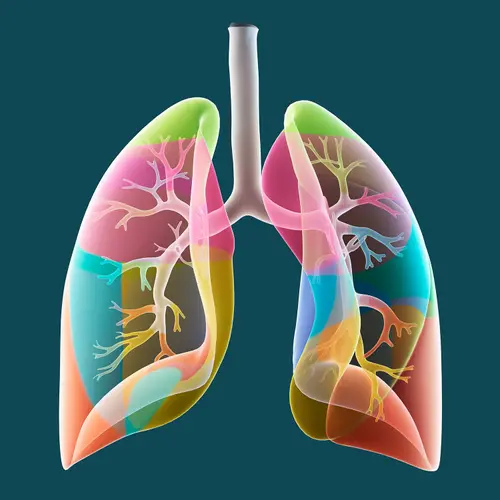Ashley Stringer of Edmond, OK, was shocked to learn in 2017 that she had lung cancer. The mom of two, who was 34 years old at the time, exercised regularly, tried to eat healthy foods, and had never smoked. “How can this be happening to me?” she remembers thinking. “‘Am I going to die? Will I get to raise my children? What will they miss out on?’ There was a lot of fear and anxiety.”
At first, everything felt overwhelming to Stringer: the tests she needed, waiting to find out if and how much her cancer had spread, learning about treatments, and going through surgery.
“There was a lot of sadness. I kept thinking, ‘Why do I have to go through this journey?’” Stringer says. “And I felt anger, because it didn’t seem fair.”
A serious condition like lung cancer can trigger a wide range of emotions such as grief, anger, and feeling helpless. Everyone is different, so there’s no “normal” way to feel. But no matter where you are in your journey, these strategies can help you handle the emotions.
Share the News in Your Own Way
Decide which people you want to know about your diagnosis, and then share the details you’re comfortable with, suggests Katie Brown, vice president of support and survivorship programs at the LUNGevity Foundation, which offers research, education, and support for people with lung cancer.
“Many people don’t realize that anyone with lungs can get lung cancer, so be prepared for questions,” she says.
If you feel overwhelmed, ask a loved one to help you share the news or answer other people’s questions for you.
Find People You Can Open Up To
When Stringer needs to be honest about how she’s feeling, she turns to her husband or one of a few close friends. “They might not get it, since they’re not in my shoes, but they’re willing to listen and hear what I’m saying,” she says. “If you can, find a person who’ll really let you cry and share your concerns but who won’t try to solve the problem. They can’t take the cancer away.”
Join a Support Group
“In-person, online, or virtual patient groups can help you connect with others who are going through the same lung cancer experiences,” Brown says. Some groups also offer access to information, experts, and free support services.
“I have benefited so very much from support groups via Zoom,” says Paula Adamson of Greensboro, NC, who was diagnosed with lung cancer in 2019.
Although the members of Adamson’s groups live in different states or even different countries, “I feel like I’m part of an extended family,” she says.
Arm Yourself With Information
“Information is power, and a way for you to gain some control over your situation,” Brown says. Ask your doctor about your type of lung cancer and the treatment options available to you, including clinical trials.
Many treatment centers and local groups can also match you with a patient or survivor mentor. “They have invaluable advice to share, and their survivorship story will inspire you,” Brown says.
Let Others Help
“Most people in your life would move mountains to help you but have no idea what to do,” says Carly Ornstein, national director of lung cancer education for the American Lung Association. “They may say, ‘Let me know what you need,’ but that doesn’t set up a great line of communication, and you may not have the energy to say, ‘I need this.’”
Make a list of tasks that someone else could do to lend a hand. Then set up a caregiving website so loved ones can sign up to cook or bring meals, run errands, help with child care, or do other chores to make your life easier.
Think of Yourself as More Than a Cancer Patient
Lung cancer may feel like a full-time job sometimes. Take a break and do something that reminds you of who you were before your diagnosis, Ornstein says. “Make a list of go-to things that will help you feel more like yourself and give you more energy to face what the next day brings.” That could mean listening to music, reading, writing in a journal, going on a walk, or playing with a pet.
Ask for Expert Help
“When someone’s diagnosed with lung cancer and is entering the oncology care system, it’s often like going into a foreign country where you don’t speak the language,” says Bill McDermott, president of the Association of Oncology Social Work.
An oncology social worker can help you make sense of the physical, emotional, and financial effects of cancer. “[They] can guide you through the system, as well as be your advocate throughout the treatment,” he says.
Some cancer support groups will match you with an oncology social worker for free.
Do the Best You Can
Nichelle Stigger of Oak Park, IL, decided to “lean in” to her lung cancer diagnosis. “The more you go against something, the harder it is for you,” she says.
She practiced meditation, focused on taking deep breaths, and enjoyed the occasional glass of wine. “I took it easy,” she says. “I took it one minute, one day, one week at a time.”
Take Care of Yourself
Getting enough sleep, eating healthy foods, trying to be active … you know that these things are good for your body, but “a healthy lifestyle can often be helpful emotionally when someone’s dealing with cancer,” says McDermott.
Morhaf Al Achkar, MD, of Seattle may not work as many hours as he did before his own lung cancer diagnosis, “but I work more efficiently,” he says. A doctor and researcher, he’s also become more involved in the cancer community and advocacy work.
“Cancer is a reminder that our life is finite. But didn’t we all know that before cancer?” he says. “It’s just a reminder to treat it as such. Live life fully.”

